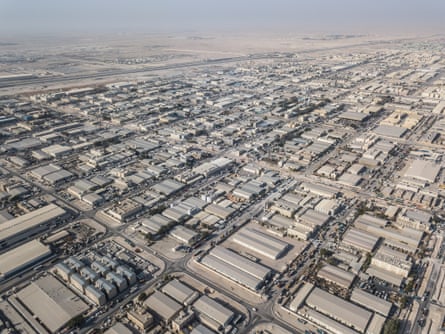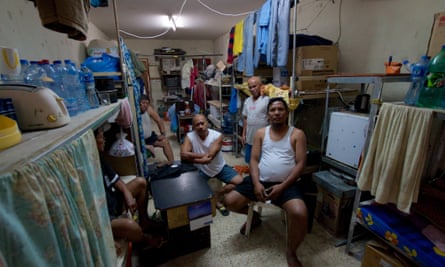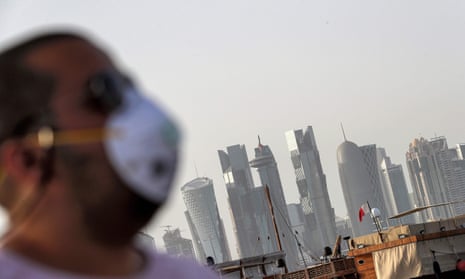Qatar’s largest labour camp for migrant workers has become a virtual prison and is in total lockdown after hundreds of construction workers became infected with Covid-19.
Police are guarding the perimeter of a huge zone within the “Industrial Area”, leaving thousands of workers trapped in squalid, over-crowded camps, where the virus can spread rapidly. No one can enter or leave, say workers who live in the area, many of whom had been working on Fifa World Cup 2022 infrastructure projects.
Inside the quarantined camps, workers describe an atmosphere of fear and uncertainty.
Sources inside the camp told The Guardian that some workers were being put on unpaid leave until further notice, with only food and accommodation covered.
“The situation is getting worse each day. Workers from camp 1 to camp 32 are in lockdown. My friends who live there are in extreme panic,” said one worker from Bangladesh.
A Nepali worker who lives inside the area under lockdown, said they are barred from leaving it. “We are not allowed to walk in groups or eat in a tea shop. But you can still buy food and take it home. I’m worried about my family back home. There won’t be anyone to take care of them if anything happens to me,” he said.

“The situation is really tense here,” said another Nepali worker.
The lockdown appears to have been enforced after the government announced 238 cases of the virus among “expatriate workers” on 11 March. A further 113 cases, most of which appear to be linked to that outbreak, were identified over the following five days.
Yet, while the World Cup host nation has shut down almost all public spaces in the face of the global pandemic, some construction workers who have not tested positive for Covid-19 say they continue to be forced to work, with little more than a temperature check before each shift.
The number of infections in the Gulf is growing rapidly with over 1,200 reported by Qatar, Bahrain, Saudi Arabia, Kuwait and the UAE.
Doha’s Industrial Area is vast expanse of warehouses, factories and workers’ accommodation about half an hour from the Qatari capital. It is home to hundreds of thousands of men, most of whom live in cramped dormitories, often packed eight or 10 to a room, making it extremely difficult to stop the transmission of the virus. Communal kitchens and toilets shared by scores of men are often unsanitary and caked in grime.
“How can workers protect themselves when most camps do not have running water and no hand sanitisers? How can you do social distancing in a camp where thousands of men are living side by side? None of the usual advice works in a labour camp”, said Vani Saraswathi, the associate editor of migrant-rights.org, who lived in Qatar for 17 years.
Some workers said they had taken matters into their own hands. “We are doing everything to keep ourselves safe. The camp was a little dirty, so we cleaned everything, changed the bed sheets, and used spray to kill the germs,” said one.
There are around 2 million migrant workers in Qatar – mostly from south Asia and east Africa – who make up 95% of the working population. The number of migrants has increased rapidly in recent years as the country gears up to host the World Cup in 2022.

Conditions are similar across the Gulf, where millions of migrant workers are the lifeblood of the economy. In Bahrain, 800 workers are reportedly in quarantine.
The picture is less clear in Saudi Arabia, Kuwait and the UAE, where the authorities have released little information about how the virus is affecting migrant workers.
This week the Qatari government announced a number of policies to boost its economy, including 75 billion Qatari rials (around £18bn) in incentives and support for the private sector.
Despite the measures, Saraswathi warned that migrant workers may face the brunt of the economic fallout of the virus, in a country where low pay and late pay are commonplace.
“The government should never have kept workers in such appalling conditions, but the least they can do now is ensure workers get their wages on time. They must keep an eye open for wage deductions and delays,” she said. “If workers can’t send money home now, their families will face real hardships just when they need money the most.”
Some workers have praised the government’s response. A Nepali labourer said he was immediately taken to hospital after he reported flu-like symptoms, and discharged only after tests for the coronavirus came out negative.
“Qatar is doing everything in its power to stop the spread of the virus. Workers are also doing everything to support the government to contain the virus by obeying the rules and regulations as they are for our common good,” he said.
Other workers were too afraid to speak to the Guardian, fearing they would be deported for talking to the media.

All countries in the Gulf have now barred entry to all foreigners, leaving tens of thousands of migrants who were due to travel to the region for work, in limbo in their own countries.
Migrant workers typically borrow large sums at high interest rates to pay recruitment agents to secure their jobs, but now face the prospect of being unable to repay them. Others who have travelled back to their home countries for a visit are unable to return, leaving them unclear if their jobs will still be waiting for them when the virus abates.
The Nepal government’s unprecedented decision on Wednesday to ban its citizens flying home from the Gulf and other countries badly hit by the virus has left millions of Nepali migrants effectively stranded overseas.
The announcement drew criticism from Ganesh Gurung, a migration expert from Nepal, who said, “I am surprised by the decision. What happens to a Nepali who does not have a visa or money to live? That is a total disaster … Migrant workers are the economic heroes of Nepal, but when there is a vulnerable situation, they are prohibited from coming home. It is a violation of their human rights.”
The Qatar government confirmed the majority of cases of coronavirus in the country have been located in the Industrial Area.
“Every effort is being made to prevent the spread of the disease in Qatar and protect every member of the population. As a result, some areas of Qatar have been cordoned off to contain the virus,” the government’s communications office said in a statement.
“Where quarantines are in place, the [relevant authorities] are working closely with employers to ensure the welfare and medical needs of the residents are met. Food, water, masks and hand sanitiser are being regularly distributed. In coordination with companies, the ministry is ensuring that workers daily needs are met and salaries paid on schedule.”
